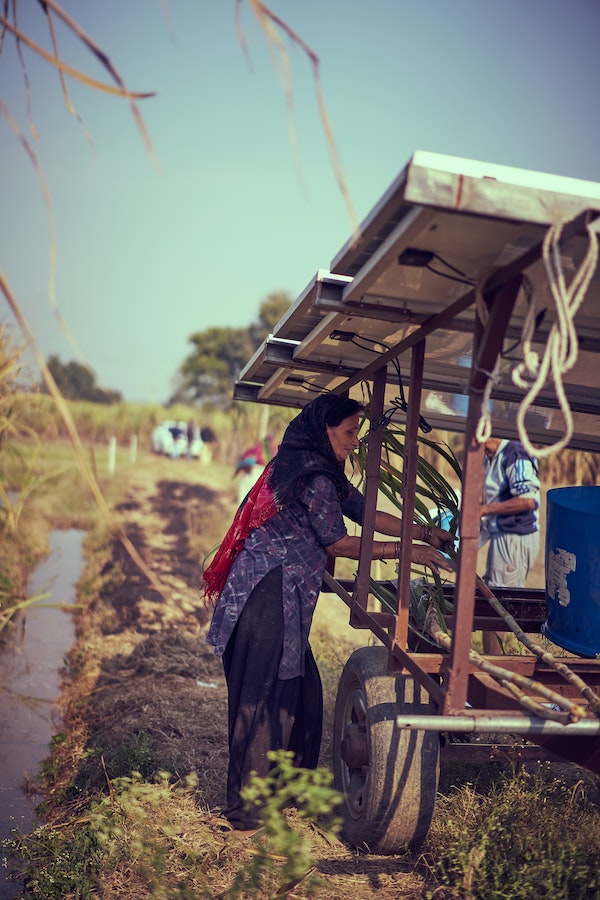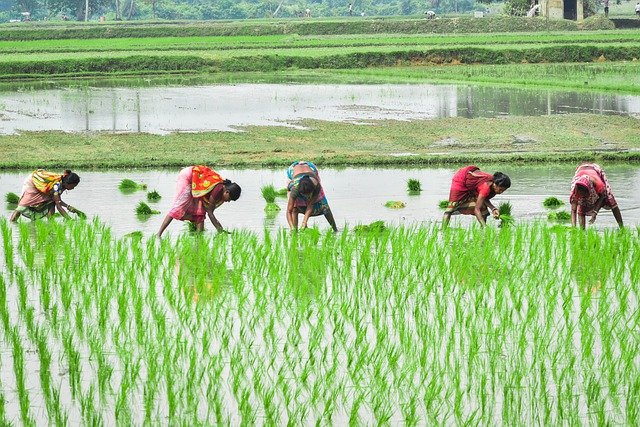
Thousands of farmers from Punjab and Haryana and their supporters have marched their way towards Delhi in the largest protest in history, with over 250 million people participating globally. But why?
In September, Prime Minister Narender Modi passed three new agricultural laws to deregulate India’s agricultural sector. Modi claims that these laws will help farmers get rid of intermediaries, but many say that this is another plan to make Modi’s rich corporate friends even richer.
Chances are you have items in your pantry or closet produced by Indian farmers. India is one of the largest turmeric exporters, and North America is one of its biggest markets. So if you think this doesn’t affect you, put down that ‘golden milk latte’ and think again.
Farmers make up over half of the Indian workforce (in a country with a population of 1.3 billion – that’s a lot of people) and play a critical role in India’s economy. According to NSSO data, a small farmer in India earns ~6,000 rupees, which translates to roughly around $81 U.S. dollars per month. This income is often used to provide for themselves and their family. 85% of farmers in India operate on just five acres or less, and in 2014, over 60,000 farmer suicides took place because of mounting debt due to rising costs resulting in their inability to repay their loans.
Indian farmers put in long hours supplying the global market with valuable crops and supplies, with less than ideal working conditions, little pay, and few rights. And now, the situation may have even gotten worse.
What is MSP?
Farmers are afraid that the new laws might dismantle the current MSP system, leaving them to large corporations’ mercy. Before diving into the new laws, it’s essential to understand the acronym ‘MSP,’ which means Minimum Support Price. The Minimum Support Price was introduced to Indian Farming in the 1960s as a guaranteed price by the government to help Indian farmers remain (somewhat) stable despite varying conditions that might impact their production or if they were unable to receive a profit. Because the input of labor can be so demanding on these farmers, MSPs were introduced as a way to provide a mutual benefit to both farmers and the government. It allows the government to incentivize farmers to continue producing crops, prevent food shortages, and motivate farmers, knowing they will get a certain amount of financial coverage for their crops. MSPs currently covers 23 crops. And even though most farmers are still working under dire conditions with little profit (they hardly ever see the full MSP), this at least allowed some protection level for the farmers.
So what are the three laws, and how do they impact the farmers?
The first is The Farmers’ Produce Trade and Commerce (Promotion and Facilitation) Act, 2020. Before this new law, trading could only occur within the Agricultural Produce Market Committee (APMC) mandis (markets). However, now farmers can directly work with corporations and private buyers and skip going through the government. This new law will severely undermine farmers by potentially dismantling the Minimum Support Price (MSPs) and government subsidies, leaving many already vulnerable farmers even more vulnerable. In short, farmers will potentially have to sell their products to corporations at ‘throwaway’ prices, which will benefit the corporations.
The next is the Farmers (Empowerment and Protection) Agreement of Price Assurance and Farm Services Act, 2020. This would allow the farmers to engage in a legal contract with the purchaser of their choice with pre-fixed prices, supposedly giving farmers more security and wealth in the long run. However, entering such a long-term contract with a large corporation will make the farmers continuously be at the mercy of the big corporations, giving them little to no bargaining power. The farmers feel that these long-term contracts in some ways enslave them. Also, with these new laws, disputes will go through a three-level dispute settlement mechanism.
The third one is The Essential Commodities (Amendment) Act, 2020. Prior to this law, stockpiling food supplies weren’t allowed unless there was a reason to do so, like war or famine. However, this new law would allow corporations to stockpile food, which gives them more power over the farmers.
The largest protest in history
The police tried hard to stop protesters from entering the national capital by using water cannons and teargas. The police also put up large cement blocks to block the highway, and four national highways entering Delhi were also blocked by the Haryana government. On the other hand, the farmers demand peaceful protests against the laws enacted on the farming community. The farmers have arrived with big ration stocks for months and have expressed that they won’t go back until their demands are accepted.
Demands of the farmers
According to Wikipedia, here is the list of the demands of the farmers:
- Repeal the three new farm laws[24]
- Convene a special Parliament session to repeal the farm laws[24]
- Make minimum support price (MSP) and state procurement of crops a legal right[25]
- Assurances that conventional procurement system will remain[26]
- Implement Swaminathan Panel Report and peg MSP at least 50% more than weighted average cost of production[27]
- Cut diesel prices for agricultural use by 50%[22]
- Repeal of Commission On Air Quality Management In NCR And The Adjoining Ordinance 2020 and removal of punishment and fine for stubble burning[28]
- Release of farmers arrested for burning paddy stubble in Punjab[26]
- Abolishment of the Electricity Ordinance 2020[29]
- Centre should not interfere in state subjects, decentralization in practice[22]
- Withdrawal of all cases against and release of farmer leaders, human right activists, poets, intellectuals, and writers.[30]
India’s farming history is long, complex and has driven many farmers to suicide. Indian farmers impact our everyday lives, and they deserve to work under fair conditions and with dignity.



 Backyard Pyar: A Unique Dating Experience for South Asian Singles
Backyard Pyar: A Unique Dating Experience for South Asian Singles Ringing in Change: Sakhi’s Historic Achievement
Ringing in Change: Sakhi’s Historic Achievement Good Indian Girl, Sort Of: Sonya Soni
Good Indian Girl, Sort Of: Sonya Soni
Patricia Vannuyen
thanks so much fo this info!